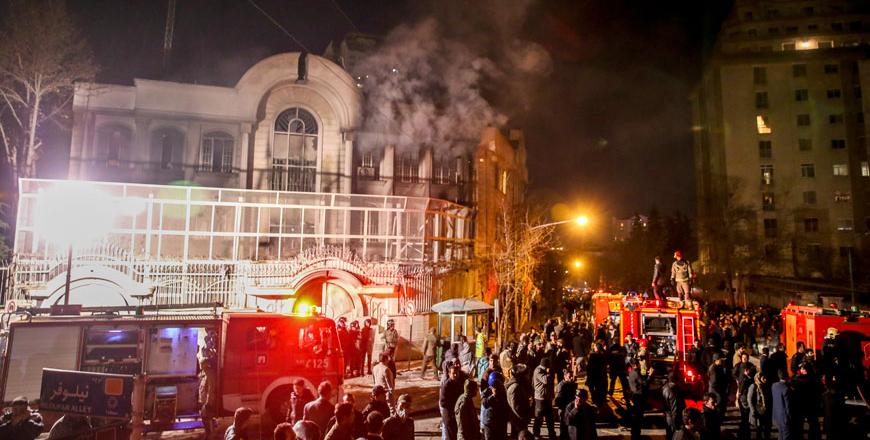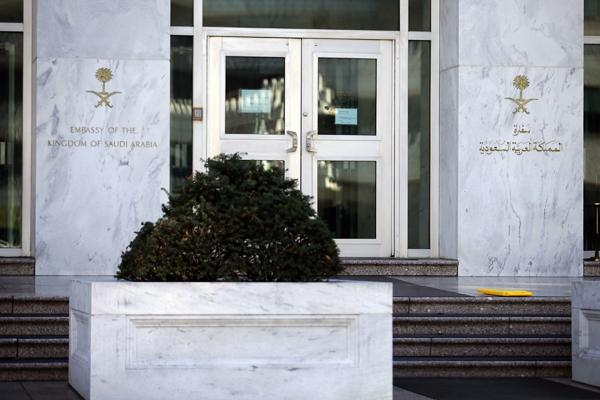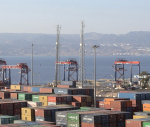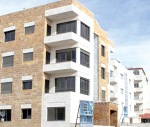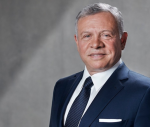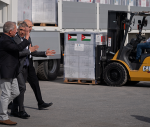You are here
Saudi-Iranian crisis widens as Kuwait recalls envoy
By AFP - Jan 05,2016 - Last updated at Jan 05,2016
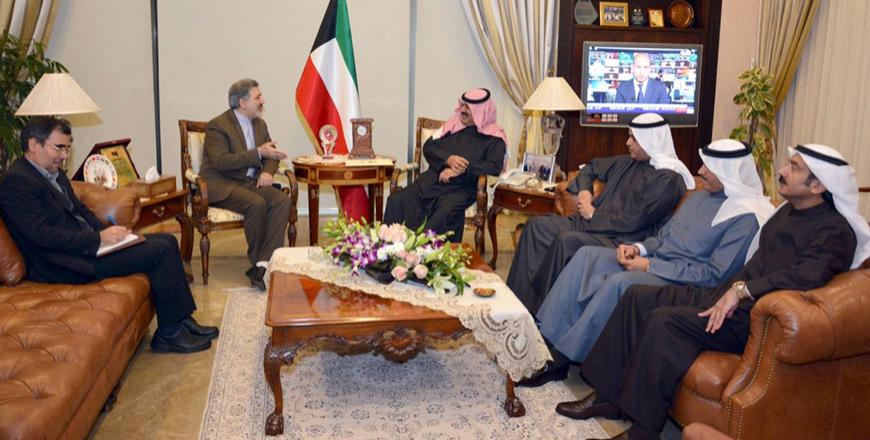
A photo released by the Kuwaiti news agency KUNA shows Kuwaiti Deputy Foreign Minister Khaled Sulaiman Al Jarallah (centre right) meeting with Iran’s Ambassador Ali Reda Enayeti (centre left) at Kuwait’s foreign ministry on Tuesday. Kuwait handed Iran a letter in protest to the attack against the Saudi Arabia embassy in Tehran on January 2 during demonstrations against the execution of prominent Shiite cleric Nimr Al Nimr by Saudi authorities (AFP photo)
RIYADH — The diplomatic crisis surrounding Saudi Arabia and Iran widened on Tuesday as Kuwait recalled its ambassador to Tehran and Bahrain severed air links in the face of growing international concern.
Joining Riyadh and its Sunni Arab allies in taking diplomatic action, Kuwait said it was withdrawing its envoy over a weekend attack on the Saudi embassy in Tehran.
Kuwait's move came after the UN Security Council strongly condemned the attack, carried out by protesters angry over Saudi Arabia's execution of a prominent Shiite cleric.
Tensions between Saudi Arabia, the main Sunni power, and Shiite-dominated Iran have erupted this week into a full-blown diplomatic crisis, sparking widespread worries of regional instability.
Iran lashed out again at Saudi Arabia for the execution on Tuesday, with President Hassan Rouhani accusing Riyadh of seeking to "cover its crime" by severing ties.
"One does not respond to criticism by cutting off heads," Rouhani said, referring to the usual Saudi practice of carrying out executions with beheading by the sword.
Washington and other Western powers have called for calm amid fears the dispute could raise sectarian tensions across the Middle East and derail efforts to resolve conflicts from Syria to Yemen.
The Security Council joined those calls late on Monday, issuing a statement urging all sides to "take steps to reduce tensions in the region".
The statement by the 15-member council condemned "in the strongest terms" the attacks which saw protesters firebomb the Saudi embassy in Tehran and its consulate in Iran's second-biggest city Mashhad.
'Very serious consequences'
But the council made no mention of the event that set off the crisis — Saudi Arabia's execution on Saturday of Sheikh Nimr Al Nimr, a cleric and activist whose death sparked widespread protests among Shiites.
Saudi Arabia cut off diplomatic ties with Tehran in protest at the attacks on Sunday and has severed air links with Iran.
Some of its allies among Sunni Arab states followed suit, with Bahrain and Sudan breaking off ties and the United Arab Emirates downgrading relations on Monday.
Bahrain — base of the US Fifth Fleet — cut all air links with the Islamic republic on Tuesday, the official BNA news agency reported.
Kuwait said Tuesday the embassy attacks “represent a flagrant breach of international agreements and norms and a grave violation of Iran’s international commitments”.
Rouhani has condemned the attacks and Tehran’s mission to the UN vowed in a letter to the Security Council to “take necessary measures to prevent the occurrence of similar incidents in the future”.
Iranian officials have brushed aside the dispute, with government spokesman Mohammad Bagher Nobakht saying Tuesday it “will have no impact on Iran’s national development”.
“It is Saudi Arabia that will suffer,” he said.
US Secretary of State John Kerry called his Iranian and Saudi counterparts on Monday to urge calm as European leaders raised concerns and Moscow offered to mediate.
UN Secretary General Ban Ki-moon also spoke by phone with the Saudi and Iranian foreign ministers to urge them to “avoid any actions that could further exacerbate the situation”, Ban’s spokesman Stephane Dujarric said.
“A breakdown of relations between Riyadh and Tehran could have very serious consequences for the region,” Dujarric said.
UN envoy holds talks
The UN envoy for Syria, Staffan de Mistura, rushed to Riyadh in a bid to defuse tensions and met foreign diplomats there on Tuesday. De Mistura is also expected in Iran later this week and in Damascus on Saturday, UN sources said.
The six-nation Gulf Cooperation Council (GCC) of Sunni Arab states said it would meet in Riyadh Saturday for talks on the embassy attacks, a day before the Arab League is due to hold an emergency meeting.
Regional powerhouse Turkey also expressed alarm at the crisis Tuesday, with Prime Minister Ahmet Davutoglu saying: “We expect all countries in the region to show common sense and take steps aimed at easing the tensions in the region.”
He said Ankara was “ready to make any effort” to help resolve the crisis.
Iran and Saudi Arabia are on opposing ends of a range of crucial Middle East issues, including the war in Syria — where Tehran backs President Bashar Assad’s regime and Riyadh supports rebel forces — and Yemen where a Saudi-led coalition is battling Shiite insurgents.
Despite the fears, Saudi Arabia’s ambassador to the United Nations, Abdallah Al Mouallimi, insisted the row would not have an impact on efforts to resolve regional conflicts.
“From our side, it should have no effect because we will continue to work very hard to support the peace efforts in Syria and Yemen,” Mouallimi told reporters.
The spike in tensions comes after Iran last year secured a historic nuclear deal with world powers led by the United States, sparking major concern in longtime US ally Riyadh.
Sheikh Nimr, one of 47 men executed on Saturday, was a driving force behind 2011 anti-government protests in eastern Saudi Arabia.
He was arrested in 2012 after calling for two Saudi governorates to be separated from the kingdom. Riyadh’s interior ministry at the time described him as an “instigator of sedition”.
Related Articles
DUBAI/RIYADH — Saudi Arabia said on Sunday it had severed ties with Iran over the storming of its embassy.Foreign Minister Adel Al Jubeir to
RIYADH — Tensions between Saudi Arabia and Iran erupted into a full-blown diplomatic crisis on Monday as Riyadh and its Sunni Arab allies cu
TEHRAN, Iran — The execution of a Shiite cleric in Sunni-ruled Saudi Arabia has laid bare the divisions now gripping the Middle East, as pro


